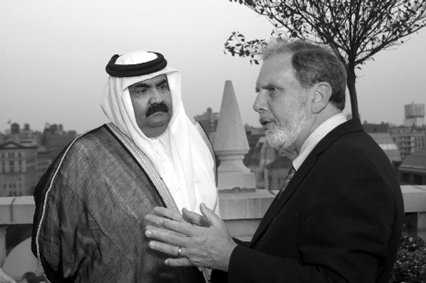By Ed Gold
Pointing a royal finger at “the greatest obstacle” to world understanding, the emir of Qatar, who heads the tiny oil-rich state in the Persian Gulf, told an audience in Greenwich Village last week that the culprit “is poverty and the suffering it brings.”
The emir, whose kindom includes about half a million people, spoke at New York University, which awarded him its Presidential Medal for being one of the most progressive leaders in the Arab world, for showing support for some democratic practices and for his conspicuous interest in education.
In stressing the poverty issue, the emir — whose full name is Shaikh Hainad Bin Khalifa Al-Thani — explained that “hungry people don’t want dialogue — they want food.… The measure of a society is how it responds to that need. The suffering that jolts us to awareness and dialogue at the same time precludes vast numbers of the world’s population from engaging in that dialogue.”
As the United Nations was meeting in New York, he lauded the U.N. Millenium Development Goals which had emerged from a conference five years ago. A prime goal was cutting world poverty and hunger in half by 2015, with nations contributing on the basis of national wealth, an approach that has not received enthusiastic support from the Bush administration.
The emir spoke last Tuesday before an invited audience of about 170 N.Y.U. students, faculty, trustees and alumni at Hemmerdinger Hall, just east of Washington Square Park.
Two other themes marked the emir’s address, which he read in Arabic:
A successful dialogue among nations requires a “respect for each others’ differences.” Without “a climate of mutual respect,” he added, a successful dialogue would be undermined.
He also noted he was troubled by stereotypical phrases, citing one in particular: “Phrases like ‘Islamic terrorist’ are no more accurate than ‘Christian terrorist’ when referring to the Oklahoma City bomber.”
Both N.Y.U. President John Sexton and Martin Lipton, chairperson of N.Y.U.’s board of trustees, called for strengthening ties with the Muslim world, and stressed the emir’s support for education.
Specifically, they noted the creation of an “Education City” in Qatar made up of American university outposts. Early in the presentation the audience had been told that four universities had accepted invitations to establish campuses in Qatar — Virginia, Cornell, Texas A&M and Carnegie Mellon. But during a short question-and-answer period following his speech, and held in English, the emir asked his wife to update the educational effort.
The wife in question, one of three and the only one with a public persona, immediately set the record straight: A fifth school, Georgetown, has now joined “Education City.”
Sheikha Mozah Bint Nasser Al-Missned heads the Qatar Foundation for Education, Science and Community Development, established by her husband 10 years ago, the year he removed his father from power in a bloodless coup.
While the “Education City” schools now have only about 350 students, the projected student population in 10 years is 8,000.
Both N.Y.U. officials and their honoree alluded to modest moves towards democracy in Qatar — in addition to the public prominence of the emir’s favorite wife. There have been efforts towards a freer press and Qatar’s first parliamentary elections are scheduled for next year.
In the past, political demonstrations have been banned. And private organizations are required to register with the government. But Qatar favors equal educational opportunities for women. Certainly, compared to its neighbor, Saudi Arabia, it can be judged far more progressive.
In foreign policy, the emir has been a staunch military ally of the U.S. in both the first Gulf War and the current Iraqi War. In fact, the U.S. established its headquarters in Qatar prior to the invasion in 2003, and has use of an air base there.
The emir did not forget diplomacy in his N.Y.U. address. His first remarks offered condolences to the victims of Katrina and he commended N.Y.U. for assisting students displaced by the tragedy.
He seems also to seek dialogue with disparate parties, having his foreign affairs minister engage in talks with both Iran and Israel.
And in answering a question about oil prices, he gave an oilman’s response:
“It’s difficult to see a decline in oil prices,” he explained, “because there is so much demand from China and India, and there is continuing instability in Iran and Iraq.”





























